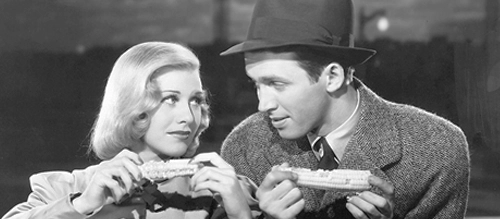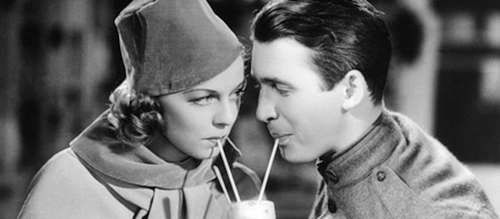5 James Stewart Movies That Made Him a Star
James Stewart was the golden boy of Hollywood’s earliest years and his ascension to stardom glittered like a champagne flute. With a simple arch of his eyebrow, he could incite raucous laughter; with a slight glimmer of the eye, he could cause cascading tears. He was loved in the United States for maintaining one constant: his relatability. Stewart’s characters were often humble and stubbornly on-principal, forever fighting for a cause. So, in the darkness of war and economic turmoil, Stewart became their all-round American boy.
The beginning of Stewart’s career coincided with a new, blossoming age of cinema. Films were bursting into vibrancy, painted with palettes of colours that brought a sense of artistic lyricism. Silent pictures faded like ancient postcards, replaced by the advancement of the ‘talkies.’ As actors found their voices, new genres came forth. Now, audiences would pile into screenings of the latest screwball comedies, musicals and social-realist powerhouses. Actors like James Stewart brought this transition to fruition; they helped this era of cinema glow like the hearth of a blackened room.
His career gained momentum in two particular genres: the rom-com and the war drama. He would play the perfect Romeo, often in the throes of puppy love, always dopey and bumbling. When his characters found love, they would feel it completely. It was as if everything else just melted away to form the silhouette of his Juliet. Audiences were left misty-eyed by his tenderness and sensitivity, matched by the passionate swelling of violin strings. But his performances in war films saw him trade love-sick devotee to hardened fighter. He would stick fiercely beside his principles, unafraid of harsh debate or criticism. Standing boldly in the face of political descension, he was the proud soldier. The duality of these roles was as clear-cut as looking at your mirrored reflection. And so, here are the five films that solidified his stardom: 5 James Stewart Movies That Made Him a Star.
1. Vivacious Lady (1938)

Vivacious Lady, directed by George Stevens, tells the love story between nightclub singer Francey (played by Ginger Rogers) and Professor Peter Morgan Jr (James Stewart). After a chance meeting, they elope. Their desperate attachment to each other is interrupted by a visit to Peter’s conservative family. They are forced to keep their marriage a secret, especially as Peter’s parents have promised him to another woman. Francey is therefore introduced as a student of Peter’s, and she is enrolled in his class. Although hilarity ensues, the couple soon realise that marriage is not as pebble-smooth as they had thought.
One of the earliest examples of a Hollywood screwball comedy, Vivacious Lady was almost an entirely different picture. It was set to be James Stewart’s seventh film, but illness and other commitments nearly saw him recast. His talent and Rogers’ insistence upon his involvement meant production was shelved. This was very fortunate as the film went onto receive great accolades, such as two Oscar nominations. Stewart himself was described as ‘one of the most knowing and engaging young actors appearing on the screen at present’ by the New York Herald, shortly after the film’s release.
As Jack Lemmon once remarked, Stewart’s talents lay in the phrasing of his eyes. They were always gentle, always brimming with longing and unspoken words. The same can be said for his performance with co-star Ginger Rogers here; as the pair were dating at the time, their chemistry is palpable and the looks they share hold months of adoration within them.
As Professor Peter Morgan Jr, Stewart achieves both comedic effect and sighs of infatuation from his audience. He must balance his authority with his deep attraction to Francey, which breeds many a problem. Even when he is holding a class, he struggles to withhold the timid romanticism Francey elicits from him. The students are quick to notice, and the soundtrack of the classroom quickly descends to wolf-whistling. It was in these smallest of moments that trickles of Stewart’s rom-com brilliance started to break through. Just like that, his image of the bashful devotee was painted in all the colours of sentimental romance.
2. The Shopworn Angel (1938)

The Shopworn Angel, directed by H. C. Potter, is a cocktail of genres; it is a sweet romance with notes of comedy but is sourly tainted by the tragedies of war. Margaret Sullavan plays Daisy Heath, a jaded actress who is lost in a sea of hangovers and discontent. James Stewart plays Bill ‘Texas’ Pettigrew, a soldier who’s in New York for basic training. After Daisy’s limousine knocks Bill down, the two are introduced and Bill becomes instantly besotted with her. He returns to camp, whereupon he lies to his buddies that Daisy is his sweetheart. And, soon after, the two begin to spend more time with each other. However, Daisy’s high-society boyfriend Sam (Walter Pigeon) soon becomes suspicious of their connection.
Originally released in 1928 by Paramount, this 1938 MGM release amplified the emotion of its predecessor. The story, once framed as part-talkie, was now given fresh lungs. And none of this would have happened without the impeccable performances from its two stars.
This pairing perhaps felt fated, as the part of Daisy was initially given to three other actresses. It bounced from person to person before landing in the lap of Stewart’s lifelong friend and, as it was later known, unrequited love. Stewart owed a great deal to his co-star; they had met in a summer stock company called the University Players and, after recognising his potential, Sullavan helped Stewart in his castings. They starred in four projects together, this being the second. We can be almost certain that it was their true, measureless connection to each other that solidified The Shopworn Angel as ‘a tearjerker in the grand manner,’ as dubbed by Time.
Stewart’s Bill is as dopey as a teenager entering their first season of love. He is a country boy who is overwhelmed by the rumbling New York streets. The looming threat of war shade Bill’s eyes with the hue of melancholia. His chemistry with Sullavan’s Daisy is instantaneous; his effect on her is miraculous, as he enthuses her and cares for her. Stewart became the sensitive, towering soldier that audiences cherished to swoon over. Stewart’s portrayal of the boyish fighter allowed the reality of war to harden in the stomach, like a bittersweet love letter. Audiences came to realise that he was much more than the face of the rom-com – he was their tragic, love-sick hero.

